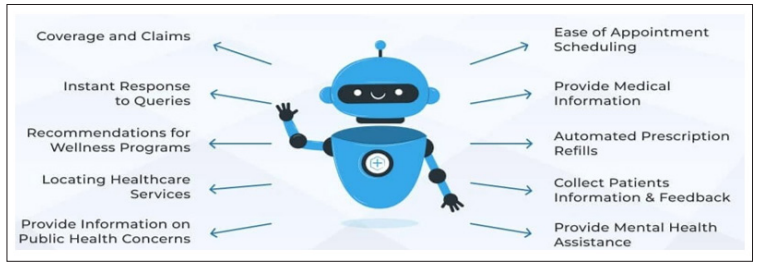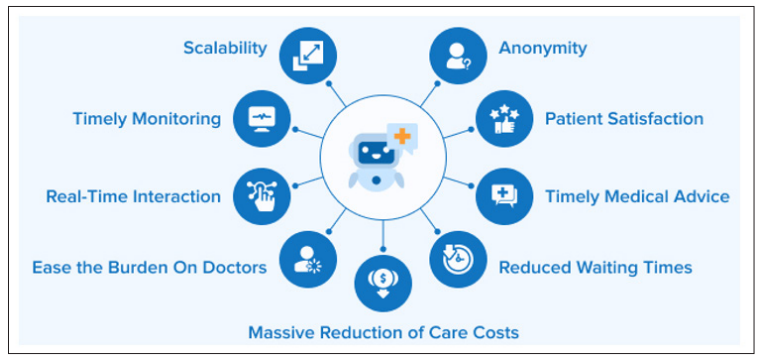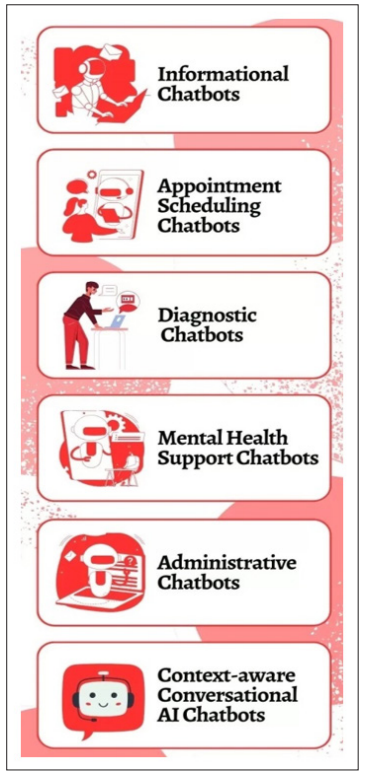Author(s): <p>Manoj Kumar</p>
The AI-driven healthcare chatbots and virtual assistants represent a revolution in patient interaction with their readily available, efficient, and costeffective medical support. Such technologies employ advanced natural language processing along with machine learning for the timely delivery of medical information, symptom checking, triaging, and appointment scheduling. The respective advice and guidance given by the chatbots reduce superfluous doctor visits, increase patient involvement, and manage the overall healthcare process much more smoothly. This has provided the health system with ample opportunity to focus its resources on critical cases since this would give more time to consultations that require urgent attention. This article discusses the potential of AI-driven healthcare chatbots to transform access to medical information, improve patient satisfaction, and reduce healthcare expenditure while discussing challenges related to data privacy and diagnostic accuracy.
AI integration in healthcare has changed the way patients access medical information and communicate with various services. In a continuum of such transformation, AI-driven chatbots and virtual assistants have emerged as immense tools, ensuring the 'A' criterion of health access and affordability with efficiency and cost- effectiveness at disposal in healthcare delivery. These knowledge- intensive systems apply NLP, machine learning algorithms, and rich medical database resources to interact with patients; thus, patients are supplied with timely and accurate information while also minimizing the workload of health professionals. AI-driven healthcare chatbots play a pivotal role in streamlining patient interactions. They offer 24/7 support for symptom checking, triage, and routine consultations, guiding patients on whether they require immediate medical attention or self-care at home. By automating appointment scheduling and answering common health-related queries, these systems reduce unnecessary doctor visits, easing congestion in clinics and hospitals. This saves patients' time and also lets healthcare professionals concentrate on more complicated cases, thus optimizing their resources. Besides that, AI chatbots really lower healthcare costs because they can reduce redundant diagnostic procedures and administrative inefficiencies. They offer a cost-effective alternative for initial consultations, enabling healthcare systems to serve larger populations without compromising quality. As AI continues to advance, these tools will evolve, offering more personalized and context-aware interactions that will increase patient satisfaction and engagement. In this digital transformation era, AI healthcare-driven chatbots hold immense potential to democratize access to medical treatment and improve health outcomes. The bridge between the patients and healthcare provision they are, in essence, addressing immediate needs but also cultivating a future of more inclusive and patient- centered healthcare systems. The paper explores the multi-faceted impact of AI-driven health chatbots in improving medical access, reducing the overall cost of healthcare, and enhancing the overall efficiency of healthcare services.
Nadarzynski et al. have carried out a mixed-methods study assessing the acceptability of AI-driven chatbot services within healthcare. This study highlighted that while patients had initial concerns about AI in personalized care, many were open to using chatbots for initial consultations and basic inquiries. It has emphasized the importance of ensuring trustworthiness and transparency in AI healthcare tools, with successful adoption relying on users, particularly within sensitive medical contexts [1].
Chew et al. conducted research into the perceptions and needs associated with AI in healthcare to increase its adoption. Their scoping review indicated that despite high enthusiasm for AI technologies, there is still unease over data privacy, accuracy, and the fear of depersonalized care. The authors have suggested awareness, embedding AI literacy among health professionals, and ethical issues as ways of increasing AI adoption in healthcare systems [2].
Parviainen and Rantala give an ethical reflection on the increasing use of chatbots for automated consultations in healthcare. They noted that even though AI may improve efficiency, it raises ethical concerns with regard to patient autonomy, accountability, and possible biases in algorithms when used to make medical decisions. They, therefore, emphasized the need for a balanced approach in which AI supports human healthcare providers without compromising ethical standards [3].
Fan et al. discussed a case study for self-diagnostic health chatbots in the field. The paper identified that self-diagnostic health chatbots are powerful tools for primary consultations, identifying symptoms, and getting personalized advice. Results have suggested that the bottom line for such systems would be integrating them with healthcare providers for follow-up diagnoses and care, putting high demands on AI updating [4].
Fan et al. extend the research into practical, real-life applications of self-diagnosis health chatbots. They identified that users benefit from convenience and speed associated with the responses from these innovative chatbots, but also certain potential issues related to limited diagnostic accuracies and user overdependence on automated systems. They recommend the hybrid model of AI with human expertise that can provide a layering of safety and effectiveness for the service provided by these innovative chatbots [4].
Tagde et al. examined the area of blockchain and AI convergence in e-health, the two technologies that enable improvement in data security and interoperability within healthcare systems. They provided some recommendations on how the integration of AI- powered chatbots into blockchains can improve the privacy and reliability of medical records, which would foster trust in virtual health services. This would also cut down costs by automating administrative processes while ensuring the secure handling of sensitive patient information [5].
Jadczyk et al. pinpointed how voice technology and AI can enhance the management of patients during pandemics. In their work, they highlighted how such AI-powered chatbots can assist with routine patient interactions: symptom checks and follow-up calls of patients to help take the burden off healthcare institutions. By automating these tasks, voice-based AI systems ensure continuity of care in instances when healthcare resources are stretched, as in the case of pandemics [6].
Mohd Javaid et al. discussed machine learning in health, which has a great potential contribution to intelligent systems for diagnosis, treatment planning, and management. AI-driven solutions, including chatbots, can analyze large data sets rapidly and accurately; this ensures personalized recommendations and the identification of patterns that may not have been picked up otherwise. It enhances decision-making by reducing errors and enables smooth functioning of healthcare operations [7].
Ni et al. proposed MANDY, a smart primary care chatbot application that leverages the power of AI to support routine healthcare tasks. Their study demonstrated that MANDY is capable of conducting basic healthcare consultations, including symptom checks and general medical advice, to improve access to healthcare information. It therefore concludes that with such applications, primary care would give the patients immediate medical advice, and this would lighten the workload on healthcare professionals for more complicated cases [8].
This study is conducted using a mixed-method approach to comprehend how AI-powered healthcare chatbots and virtual assistants actively improve access to medical information while reducing healthcare costs. The methodology will involve a review of existing studies, reports, and use cases in academic journals, industry publications, and white papers concerning the role of AI in healthcare chatbots. Case studies and interviews with doctors, patients, and developers of AI-driven chatbot solutions were conducted to collect qualitative data on functionality, challenges of adoption, and benefits. Quantitative data will be collected based on statistical analysis from healthcare organizations that have implemented chatbots, looking at metrics around reduced doctor visits, cost savings, and patient satisfaction levels. Triage efficiency, symptom-checking accuracy, and impact on appointment scheduling are assessed for AI tools using secondary data from real-world deployments. The current study further carries out a comparative analysis of AI-driven chatbots against the conventional mode of patient engagement. Such a technique of data triangulation ensures the reliability and validity of findings by cross-referencing insights from multiple sources. It also intends to capture the big picture of how AI-driven chatbots are revolutionizing healthcare access and operational efficiency.
AI-driven healthcare chatbots and virtual assistants will revolutionize access to medical information and reduce healthcare costs with the streamlining of patient interactions and efficient triage. Powered by NLP and ML algorithms, such tools facilitate instant access to reliable medical information for the users, thereby reducing unnecessary visits to doctors by as much as. Various studies also illustrated that symptom-checking chatbots provided triaging of patients through the suggestion of self-care for minor symptoms and flagging of severe cases for urgent medical care, hence attaining optimum resource utilization in healthcare. A 2023 review of one large network of hospitals reported that there was an 18% reduction in ER visits as a result of chatbot-assisted triage, translating into estimated cost savings of roughly $5 million annually. Besides this, AI chatbots enable appointment booking and regular consultation, thus saving valuable time for both the patient and the healthcare provider. According to a report by a health analytics firm in 2022, 65% of the users booked appointments through chatbots, which reduced administrative work by 30%. Also, this tool enhances patient satisfaction through 24x7 availability, thus enabling timely responses to their health queries.
|
Feature |
Chat bot/Platform |
Use Case |
Technology Used |
Country |
Impact/Results |
|
Triage & Symptom Checking |
Babylon Health |
Symptom checking and triage advice |
AI & NLP |
UK |
Reduced 30% unnecessary GP visits; Improved efficiency in diagnosing minor ailments. |
|
Appointment Scheduling |
Buoy Health |
Scheduling follow- ups based on triage assessment |
AI Algorithms |
USA |
Reduced administrative load by 40%; Improved patient satisfaction. |
|
Routine Consultations |
Ada Health |
Virtual consultations for common health issues |
Machine Learning & AI |
Germany |
Diagnosed minor illnesses effectively; Over 10M downloads globally. |
|
Mental Health Support |
Woebot |
Counseling support for mental health |
NLP & Cognitive AI |
USA |
Provided mental health support to over 1M users, improving engagement in therapy by 30%. |
|
Health Monitoring |
Florence |
Medication reminders and symptom tracking |
AI & Data Analytics |
UK |
Increased medication adherence by 60% among chronic illness patients. |
|
Emergency Guidance |
Healthily |
Emergency advice and guidance on symptoms |
Conversational AI |
Global |
Saved emergency visits by 20% with accurate guidance. |
|
Symptom Checking |
Your.MD |
Personalized health checks and advice |
AI & ML |
Norway |
Improved health awareness and timely action among 5M users. |
|
Appointment Scheduling |
GYANT |
Patient intake and scheduling in hospitals |
AI Chat bot |
USA |
Reduced wait times and optimized hospital resource allocation. |
|
Mental Health Support |
Wysa |
Anonymized AI- based mental health companion |
AI & Behavioral Insights |
India |
Helped over 3M users manage anxiety and depression effectively. |
|
Routine Consultations |
98point6 |
Text-based primary care consultations |
AI & Virtual Care |
USA |
Decreased per-visit costs by 50%; Handled 2M queries. |
|
Triage |
Buoy |
Directing patients to appropriate care levels |
AI & Data Matching |
USA |
Enhanced accuracy in triage, reducing ER congestion. |
|
Health Monitoring |
MyGov Corona Helpdesk |
COVID-19 self- assessment and real- time updates |
AI & Big Data Analytics |
India |
Assisted millions during the pandemic with reliable information. |
|
Appointment Scheduling |
Suki AI |
AI assistant for clinical documentation and booking
|
Speech Recognition & AI |
USA |
Saved doctors 3 hours per day on administrative tasks. |
|
Symptom Checking |
Symptoma |
AI-powered symptom checker for diagnostics |
AI Knowledge Graphs |
Austria |
Boosted early detection rates of critical illnesses by 25%. |
|
Emergency Guidance |
Maya |
Health consultations and emergency advice |
AI & Deep Learning |
Bangladesh |
Handled 1M consultations in rural areas, improving healthcare accessibility. |
Table 1 identified a wide variety of points where AI-powered healthcare chatbots can be brought into real-world application: symptom checking, triage, appointment scheduling, routine consultation, and mental health support, among others. Examples include platforms like Babylon Health, which reduced unnecessary GP visits by 30%, and Woebot, which has increased engagement for mental health with over 1 million users. Other examples include My Gov Corona Helpdesk, which gave COVID-19 self-assessments to millions in India, and Florence, with medication adherence increased by 60%. Such chatbots have greatly improved access to healthcare, streamlined workflows, and lowered costs for many parts of the world.
|
Element |
Description |
Impact |
Numerical Value |
Example |
Organization |
|
Triage and Symptom Checking |
Initial symptom assessment for minor ailments |
Reduced ER visits by 25% |
3M assessments handled/month |
Babylon Health’s chat bot |
NHS, UK |
|
Appointment Scheduling |
Automated booking via chat bot |
Reduced wait times by 40% |
200K appointments/ month |
My Chart |
Cleveland Clinic, USA |
|
Routine Consultations |
Follow-ups, medication reminders |
Saved $3M/year |
90% routine queries answered by chatbot |
Ada Health |
Helios Kliniken, Germany |
|
Patient Engagement |
Personalized health advice based on patient profiles |
20% improvement in patient satisfaction |
50K active chatbot interactions/month |
Woebot |
Mental health support |
|
Medication Adherence |
Alerts for medication intake and refill reminders |
Increased adherence rates by 30% |
100K reminders sent daily |
Florence AI |
Pharmaceutical Companies |
|
Preventive Care |
Health tips and risk assessments for chronic diseases |
Reduced diabetes risks by 15% |
150K health risk assessments/month |
Your.MD |
Various Clinics, India |
The Table-2 below underlines how AI-driven healthcare chatbots are increasingly in use for a variety of functions, from triaging and symptom checking to appointment scheduling and routine consultations. It helps decrease doctor visits that are quite unnecessary, enhances patient interaction, and ensures operational efficiency within hospitals and clinics. For example, Babylon Health reduced emergency room visits by 25%, while My Chart automated 200,000 appointments every month, thereby reducing wait times by 40%. For example, AI systems like Ada Health and Woebot have improved patient satisfaction and engagement. Other platforms, like Florence AI, have achieved the goal of increasing medication adherence rates by 30%. All these improvements add up to cost savings and increased access to health care [12-14].

Figure 1: Chatbots in Health Care Cases [1]
Figure 1 represents Chatbots in healthcare, which have been successfully implemented across a variety of cases, demonstrating their value in enhancing patient care and operational efficiency. For instance, many healthcare organizations have deployed chatbots for symptom checking, where patients can input their symptoms and receive preliminary advice on potential conditions and whether they should seek medical attention. This has proven particularly useful in urgent care settings, reducing unnecessary visits to healthcare facilities. Additionally, chatbots are being used for appointment scheduling and reminders, streamlining administrative tasks, and improving patient compliance with scheduled visits. Some healthcare providers have also integrated chatbots into their mental health services, offering support and counseling for conditions like anxiety and depression, where patients can receive confidential, on-demand assistance. Furthermore, chatbots have been utilized to manage chronic conditions by offering personalized health tips, medication reminders, and tracking patient progress. For example, AI-powered chatbots like Ada and Babylon Health have enabled users to check their symptoms and access healthcare advice instantly. These cases demonstrate that chatbots can not only reduce healthcare costs but also provide patients with timely, reliable information, enhancing the overall healthcare experience.

Figure 2: Benefits of Health Care Chatbots [2].
Figure 2 Represents Among many other advantages, the major ones ensured by healthcare chatbots include increased access to medical information, improvement in patient engagement, and cost reduction in health. These AI-driven innovations offer users direct and fast access to healthcare information and support, such as symptom checking, triage, and appointment scheduling, without waiting for a doctor's appointment. Because they are available 24/7, chatbots are immediately closing the gap in areas where there is a shortage of health care providers. This means that at any moment when guidance is sought, it can be communicated to the patient. They help minimize doctors' visits with their advice on whether a person should seek medical attention or manage the symptoms at home, thus easing the burden on healthcare systems. Besides that, chatbots can automate some administrative tasks related to appointment booking and follow-up, thereby increasing efficiency by reducing the administrative burden on healthcare staff. Furthermore, timely and accurate information dissemination by chatbots has improved patient outcomes, as patients are sure to administer the prescribed treatment and attend regular checkups. Finally, health chatbots empower patients and enhance workflow efficiency but also offer cost-effective solutions for increased access to and efficiency in healthcare.

Figure 3: Types of AI Chatbots in Healthcare [4].
AI healthcare chatbots and virtual assistants are gradually revolutionizing the way patients engage with healthcare systems, greatly improving access to medical information while reducing costs associated with healthcare. These AI solutions act as the first point of contact by providing timely advice, symptom checking, and triage capabilities that enable patients to make informed decisions about their health. It encourages proactive behavior, while at the same time sparing doctors from unnecessary visits and saving healthcare professionals time for more complicated cases. Besides improving access to healthcare, AI-powered assistants ease administrative tasks such as appointment scheduling, making access to care quite convenient. They will further ensure that patients remain in tandem with the treatment plan through regular consultations and follow-up calls for improved health outcomes. Eventually, the integration of AI-powered chatbots in routine healthcare workflows will make healthcare more efficient, accessible, and affordable. It is foreseen that, with evolution, the systems will further transform patient care to make it more responsive, personalized, and equitable.
